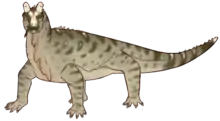Sphodrosaurus
Sphodrosaurus[1][2] is an extinct genus of basal archosauriformn reptiles from the Late Triassic-aged New Oxford Formation (not the Brunswick Formation as initially suggested) of Pennsylvania. The type species is S. pennsylvanicus, described by Edwin Colbert in 1960.[3] The holotype (NMN, Franklin and Marshall College 2321; the cast is listed under AMNH 7601) consists of a partial skeleton including the back of the skull, the vertebral column, all of the ribs, all of the hindlimbs and part of the upper forelimbs; Sphodrosaurus was originally believed to have been a member of the Procolophonidae[3] while more recently Sphodrosaurus was believed to be a basal member of the Diapsida by most authors starting with Sues et al. (1993),[4] or a member of the Rhynchosauria (Baird, 1986[5]). In 2022, Ezcurra & Sues redescribed the holotype in detail and placed it in a phylogenetic analysis with other Triassic diapsid reptiles, where it was found as the basalmost doswellid.[6]
| Sphodrosaurus Temporal range: Late Triassic, ~ | |
|---|---|
 | |
| Fossil | |
| Scientific classification | |
| Kingdom: | |
| Phylum: | |
| Class: | |
| Subclass: | |
| Order: | |
| Genus: | †Sphodrosaurus Colbert, 1960 |
| Binomial name | |
| †Sphodrosaurus pennsylvanicus Colbert, 1960 | |
References
- "Sphodrosaurus Colbert, 1960". www.gbif.org. GBIF. Retrieved 2021-04-25.
- "Fossilworks: Sphodrosaurus". fossilworks.org. Fossilworks. Retrieved 17 December 2021.
- Colbert, E. H. (1960). A New Triassic Procolophonid from Pennsylvania. American Museum Novitates 2022:1-19
- Sues, H-D., Baird, D., and Olsen, P.E. (1993). Redescription of Sphodrosaurus pennsylvanicus Colbert, 1960 (Reptilia) and a Reassessment of its Affinities. Annals of Carnegie Museum 62(3):245-253
- Baird, D. (1986). Some Upper Triassic reptiles, footprints and an amphibian from New Jersey. The Mosasaur 3:125-153
- Ezcurra, Martín D.; Sues, Hans-Dieter (2022-05-13). "A re-assessment of the osteology and phylogenetic relationships of the enigmatic, large-headed reptile Sphodrosaurus pennsylvanicus (Late Triassic, Pennsylvania, USA) indicates archosauriform affinities". Journal of Systematic Palaeontology. 19 (24): 1643–1677. doi:10.1080/14772019.2022.2057820. ISSN 1477-2019. S2CID 248785154.




